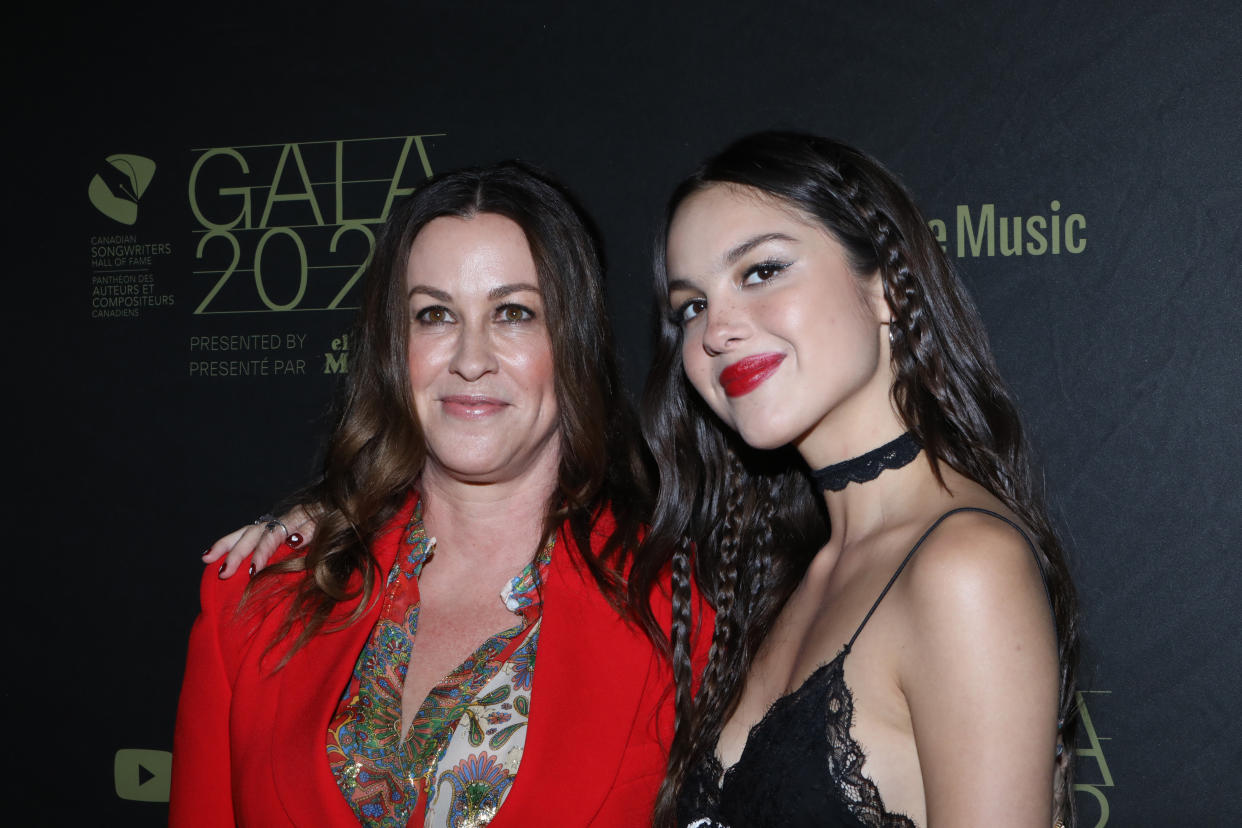Alanis Morissette on the legacy of 'Jagged Little Pill,' raging against the patriarchy and mentoring younger artists: 'It was something that I wished for in the '90s'
For a long time, Alanis Morissette felt alone.
From a career standpoint, she was doing considerably well for a teen in 1990s Ottawa, Ontario. She had released two dance-pop albums before she was legally allowed to drink in her native Canada (the legal drinking age up north is 19 in most areas). She had signed a two-album record deal and was drawing comparisons to Debbie Gibson. She was on a trajectory that, if correctly followed, would likely amount to local teen pop stardom — but Morissette felt misunderstood. She was coming of age yet she wasn’t actually allowed to talk about the complicated rage that came with it — at least as an artist.
“I’d been writing with people in Canada who really wanted to just take the lead,” she told Yahoo Entertainment. “They were underestimating my ability to write. Then, I started writing with [music producer] Glen [Ballard] and [he was] basically inviting me to express myself very authentically. A complete contrast to what [my] experience was as a teenager, where I was encouraged to write less.”
In 1995, she released Jagged Little Pill.
“My main goal was to write a record I loved,” she said. “I achieved that.”
Morissette has come a long way since then and is now headlining a tour with special guests Joan Jett and the Blackhearts and Morgan Wade. While she says she felt loneliness in those early years, she has since developed a strong voice that got its start with the Grammy Award-winning album.
Her third album overall but first release worldwide, Jagged Little Pill marked Morissette’s first foray into alternative rock. It went No. 1 in 13 countries and to date has reportedly sold more than 33 million copies around the world, making it one of the bestselling albums of all time. Morissette made history as the first Canadian artist to reach double diamond status — to sell more than 20 million units — and became the youngest artist at the time to nab Album of the Year at the Grammy Awards. Jagged took home five out of the nine Grammys it was nominated for.
Morissette was finally speaking her truth — and the world was listening. With her “metaphorical helmet” on, she crafted a record that was a real representation of where she was at that moment.
“When I was younger, my anger was very personal. Hyper-personal in a way that might be obvious with Jagged Little Pill,” she said. “And then as I got older, my anger would show up on behalf of more macrocosmic issues. Issues with the feminist movement, issues with melting patriarchy, gaslighting, narcissism, abuse, all of this stuff.”
The album’s commercial success was proof of its resonance with listeners.
“I’m chronicling the unfolding of a lifetime,” she added about the album. “What I’m realizing is that there’s a lot of people who relate to the chapters and the phases. I just feel way less alone than I did when I was 21 touring Jagged Little Pill.”
Morissette’s loneliness at 21 was a source of comfort for many. Her artistry has caused a ripple effect in the music industry, with modern singer-songwriters and bona fide female pop-rock stars screaming about the pain of growing up and getting older, of soul-crushing heartbreak and living in a patriarchal world. Morissette’s influence is hardwired into artists from younger generations, like Olivia Rodrigo and indie pop band Muna, who’ve made their adoration for the “Ironic” singer known.

“In so many ways, whether it’s Sinéad O’Connor or Tori Amos, I’ve been standing on the shoulders of giants my whole life,” Morissette told Yahoo. “I feel honored to be part of a natural unfolding of influencing younger generations or even mentoring or supporting [them] from afar. It was something that I wished for in the ’90s. I wished that I could have leaned on some women who were ahead of me in their journey.”
It seems as though Jagged changed Morissette’s life in more ways than one. Of course, it marked the beginning of her 30-plus-year career as a well-respected recording artist known for her urgency and introspection. But it also reinforced what Morissette had always known about herself — that she’s an activist to “the marrow of my bones.”
While she still feels directly impacted by misogyny, her priorities have shifted over the years. Now, Morissette is more empowered to show up for causes that affect people en masse.
“This is a very good time to be alive as an empath and a highly sensitive artist,” she said. “Because we’re living in a culture where there’s a little more openness. Contrary to what the bad news might say, we’re living in a very, very exciting time where misogyny is melting. Politically, things have gone backwards with Roe v. Wade, etc. But there’s a centrifugal force moving us forward right now.”

For Morissette, building up her community and connecting with people who are as sensitive and focused on wholeness as she is, is central to her being.
“I’m on the top part of that wave on my surfboard. I always have been, quietly or otherwise. I just feel like it’s my rightful seat. It’s exhausting. I’m exhausted. But it’s who I was born to be,” she said.
Nearly two months into the “Triple Moon Tour,” Morissette’s schedule remains jam-packed. While her exhaustion may persist, the Storm Before the Calm singer, who recently partnered with UScellular to promote healthier digital habits, is making an active effort to prioritize her mental health on the road.
“I get so overstimulated and I’m very responsible for that because things can go very badly very quickly,” she admitted.
But growing up in the ’90s (she refers to herself as an “old lady”) instilled habits that have helped her remain present.
“The interiority muscle can get used when we’re not distracted by all this really fun social media world,” Morissette said. “The humanity of looking within and feeling connected within can go away if we’re mired in iPads and iPhones in our faces. So for me, it’s not that big of a struggle. I think because of my generation, I have that in my pocket. I can be found off the internet.”


